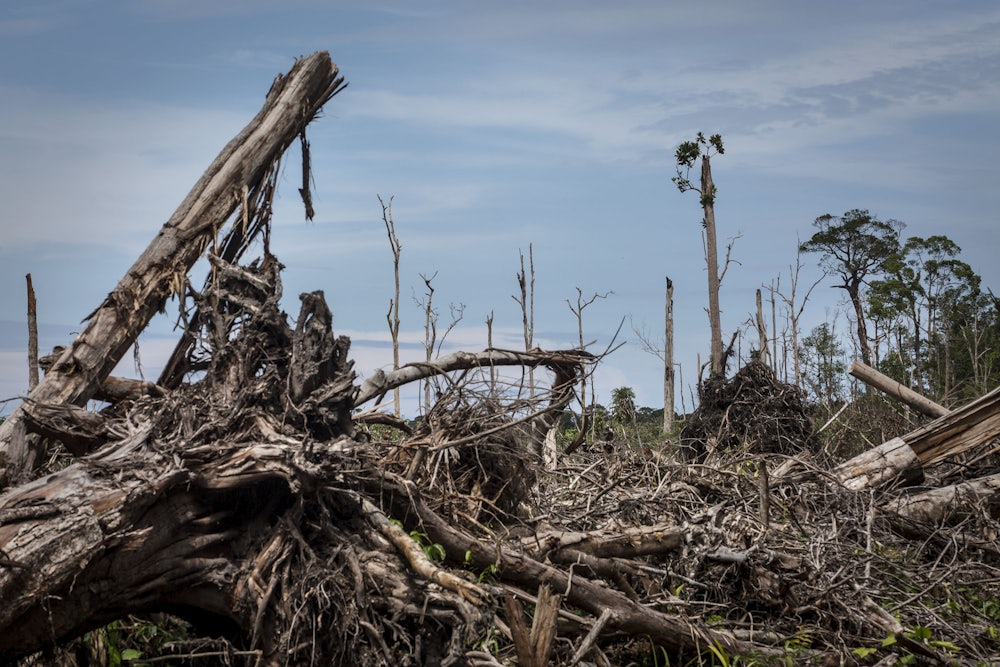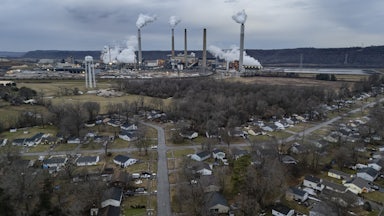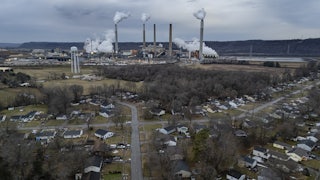La Mosquitia is a lush, mountainous expanse of forest straddling the Rio Coco, the river that forms a natural border between Honduras and Nicaragua. The second-largest forest in Central America, it provides a home to countless unique flora and animals like jaguars, ocelots, white-lipped peccaries, scarlet macaws, and harpy eagles. It is also disappearing at an alarming rate, as farmers deforest large swaths of land to raise cattle and grow crops like coffee and palm oil, the end products destined for sale in international markets.
A solution to helping end the destruction of La Mosquitia could come from a surprising place: the state of New York.
Last month, the New York Assembly quietly passed a bill that requires companies contracting with state and local governments to prove they are not contributing to tropical deforestation directly or indirectly through their supply chains. The New York State Tropical Deforestation-Free Procurement Act will land on Governor Hochul’s desk this fall. Advocates believe this act could end up being one of the state’s most powerful tools to tackle a kind of greenhouse gas emission that’s been tricky to rein in—and it could have ripple effects that go far beyond the state’s borders.
“There is no way through the climate crisis unless we reduce tropical deforestation,” said Jeff Conant, a director at the environmental organization Friends of the Earth, who has been advocating for the bill for the last several years. “There have been a decade of efforts to get companies to agree to voluntary commitments, but none of that works. This bill is really about using state power to drive the change we need.”
Deforestation is the second-largest source of climate emissions after the burning of fossil fuels, and it’s driven primarily by just a handful of globally traded commodities: cattle, soy, palm oil, coffee, cocoa, timber, and wood products. Tropical countries have been put in the line of fire for the continued deforestation of one of the world’s most important carbon sinks, but most of the commodities driving that deforestation end up in international markets like the United States, the European Union, and China.
For over a decade, companies and governments have pledged to address deforestation in their supply chains—but it’s still happening at a staggering pace. In 2022, the world lost a forest area the size of Switzerland, 10 percent more than was lost in 2021, according to the World Resources Institute. That’s horrible news for the climate. Forests store about 400 gigatonnes of carbon and are essential to keeping global temperatures to within 1.5 degrees Celsius (2.7 degrees Fahrenheit) of preindustrial levels. (Deforestation is also a key driver of biodiversity loss and is connected to a slew of human rights abuses, from child labor on cocoa farms in West Africa to slave labor on cattle farms in the Amazon.)
Trusting corporations to clean up their act without government oversight has been a mostly failed exercise. Food and beverage companies that trade in those commodities driving forest loss have struggled to meet any of their multiple pledges to voluntarily slash deforestation from their supply chains. Other mechanisms for reducing deforestation, such as trading carbon credits, have been shown to be full of loopholes and greenwashing.
Experts have long argued that regulating trade is one of the key ways the U.S. can help reduce deforestation abroad. New York’s bill could have an outsize impact on tropical deforestation globally: The gross domestic product of New York state is one of the largest in the world, comparable to those of entire countries like Brazil, Canada, and South Korea.
The bill, introduced by State Senator Liz Krueger, would make New York the first state in the country to regulate “forest-risk” commodities. If it’s passed into law, any company supplying to New York state agencies or contractors—from timber for boardwalks to cafeteria hamburgers and coffee—would have to provide public data on every point of its supply chain, proving that its products do not come from land that has been cleared after January 1, 2023.
“Our hope is that first we stop our taxpayer dollars from funding deforestation,” said Justin Flagg, director of communications and environmental policy for Senator Krueger. “But we also want to help push forward this global movement on supply chain transparency and traceability and sustainability.”
Surprisingly, businesses and investors have shown support for the bill, in what many see as a desire for aligning public policies with a growing international demand for supply chain transparency. Investors representing over $2.5 trillion in assets under management wrote a letter in favor of the bill. The new rules, they wrote, would provide investors with important information on the risks of businesses stemming from deforestation and human rights abuses.
“Merging expectations around where you’re sourcing from and what the impacts are is important for demonstrating responsible business and for addressing the climate crisis,” said Mary Beth Gallagher, a director at the investment advisory group Domini Impact Investments, who organized the letter. “And it is important for being competitive in business.”
A U.N. report released last year estimated some of the world’s largest food and farming companies could lose more than a quarter of their value by 2030 if they do not adapt to new climate risks. A separate report by the Carbon Disclosure Project and the Accountability Framework initiative identified $80 billion of forest-related risks among more than 200 disclosing companies—and that responding to those risks would cost less than $7 billion.
The New York bill might be a sign of a growing trend. This year, the EU adopted its long-awaited deforestation-free regulation, which requires EU-based companies to ensure that imports and exports of cattle, cocoa, coffee, oil palm, rubber, soy, and wood have not been produced on recently deforested land and comply with all laws in the country of production, including human rights and Indigenous people’s rights laws. The Securities and Exchange Commission is also expected to pass a new law by the end of the year that will require companies to disclose their greenhouse gas emissions and climate risks from their supply chains, with penalties for those that don’t comply.
Similar bills to limit products causing deforestation have been proposed in the U.S. Senate and in California, although with less momentum than overseas. The “Forest Act,” which prevents the import of products derived wholly or in part from illegally deforested land, is awaiting introduction into the current Congress. Governor Gavin Newsom vetoed the California bill in 2021 over concerns about how it would impact small businesses. In his veto message, Newsom commented that he would consider future deforestation legislation that targets supply chains; the success of the New York bill, which has a number of considerations to lessen the impact increased due diligence could have on small businesses, could provide a jumping-off point for a new effort.
Manuel Carmona Yebra, counsellor for environment and oceans for the Delegation of the European Union to the United States, said that what makes the New York bill stand out is its emphasis on both legal and illegal deforestation. This will force companies to invest in independently tracking their supply chains, rather than depending on government designations of “illegal deforestation,” which can be easy to manipulate.
“Once you talk about deforestation in general, regardless of the laws of any one country, it means you need to start using things like geolocation and new technologies,” said Yebra.
A key requirement for companies is that they collect and supply precise geographical information on the farmland where the commodities that they source have been grown. Recent advances in the quality and availability of data to trace supply chains, from tools such as Global Forest Watch and Trase to high-resolution satellite data, mean that companies increasingly have no excuse not to track where their products are coming from.
While the bill is ambitious, its immediate effectiveness would depend in part on how well it is implemented by the Office of General Services, or OGS, which oversees state contracts and would be primarily responsible for implementing the bill. If a contractor is found to have supplied a commodity that has caused recent deforestation—such as coffee or beef—it would face penalties or the loss of its contract. The bill also foresees a public complaint mechanism where third parties can submit complaints. It remains to be seen how effective OGS will be at reviewing corporate data—and how stringent it will be in penalizing companies that don’t follow the rules.
Even if the implementation is not as fast or effective as desired, advocates of the bill say that any steps to make sure that states like New York are not driving deforestation abroad could be a massive win for the climate.
“Deforestation is such a critical part of the climate puzzle and perhaps doesn’t get as much attention as it should because it doesn’t feel as immediate to us; it’s not installing a heat pump or buying an E.V. or something like that,” said Flagg. “It’s important that we start looking beyond our own backyard, as important as that is, and also start looking at our broader impact on the world.”










